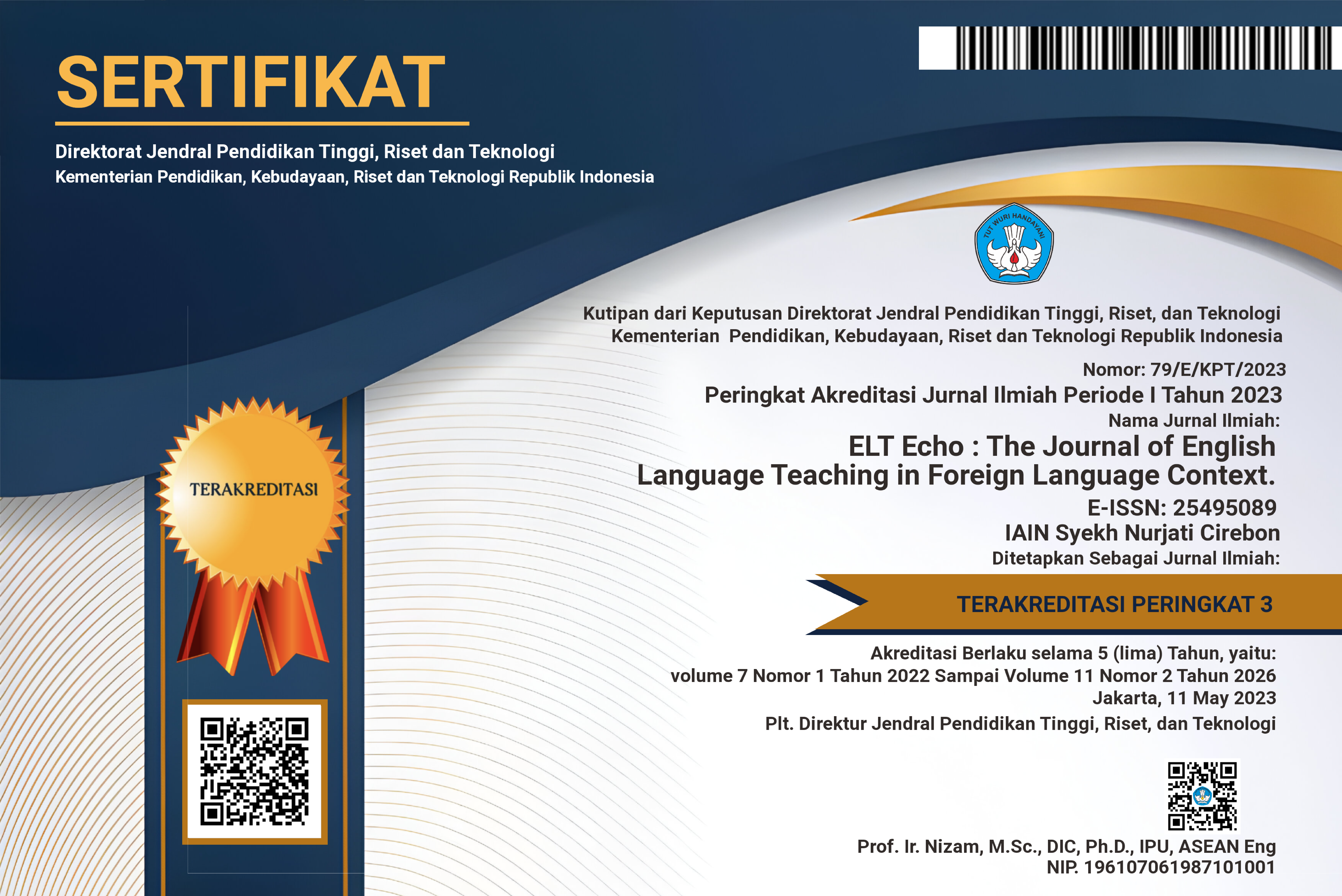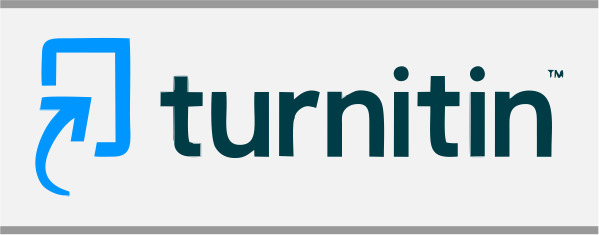SOURCES OF SELF-EFFICACY INFLUENCING ENGLISH SPEAKING SKILLS OF EFL LEARNERS
(1) Universitas Islam Negeri Ar-Raniry Banda Aceh
(2)
(*) Corresponding Author
Abstract
Keywords
Full Text:
PDFReferences
Abduh, A., Jayadi, K., Basri, M., & Arham, M. (2022). Self-Efficacy in Speaking Based Activities for Art and Design Students. International Journal of Language Education, 6(1), 91-100.
Abun, D., Asuncion, S. B., Lazaro, J. R., Magallanes, T., & Nimfa, C. C. (2021). The effect of educational attainment, length of work experience on the self-efficacy of teachers and employees. International Journal of Business Ecosystem & Strategy (2687-2293), 3(2), 16-28.
Alam, S. P., & Nirma, O. N. (2021). Speaking Self-Efficacy of EFL Students of Pre-Service Teaching Program in EFL Classroom Setting. Journal of English Teaching, 7(2), 150-162.
Alawiyah, T. (2018). Speaking Self-Efficacy and EFL Student Teachers’ Speaking Achievement. Edukasi: Jurnal Pendidikan Dan Pengajaran, 5(1), 87–96.
Aliyu, M. M., Korau, S. M., & Basiru, A. (2019). Reducing Undergraduates Speaking Anxiety through Class Interactions and Oral Presentations. Asian Journal of Contemporary Education, 3(1), 36-43.
Anam, S. U., & Stracke, E. (2020). The role of self‐efficacy beliefs in learning English as a foreign language among young Indonesians. Tesol Journal, 11(1), e00440.
Ardi, P., Amalia, S. N., Widiati, U., Walker, D., & Prihandoko, L. A. (2024). Writing Enjoyment among EFL Postgraduate Students in Indonesia: The interplay between students' writing self-efficacy and research literacy and teachers' immediacy and clarity. LEARN Journal: Language Education and Acquisition Research Network, 17(1), 632-661.
Bandura, A. (1977). Self-efficacy: Toward a unifying theory of behavioral change. Psychological Review, 84, 191–215.
Bandura, A. (1997). Self-efficacy: The exercise of control. New York: Freeman.
Bandura, A. (1999). A social cognitive theory of personality. In L. Pervin,& O. John (Eds.), Handbook of personality(2nded., pp. 154-196). New York: Guilford Publications (Reprinted in D. Cervone & Y. Shoda (Eds.), The coherence of personality. New York: Guilford Press).
Bandura, A. (2001). Social cognitive theory: An agentic perspective. Annual Review of Psychology, 52(1), 1-26.
Bandura, A. (2006). Adolescent development from an agentic perspective. In F. Pajares, & T. Urdan (Eds.), Self-efficacy beliefs of adolescents (pp. 1–43). Greenwich, CT: Information Age Publishing.
Bandura, A. (2011). A social cognitive perspective on positive psychology. International Journal of Social Psychology, 26(1), 7-20.
Belladina, C., Purwanti, I. T., & Eliwarti, E. (2024). Indonesian EFL Students’ Writing Self-Efficacy: Inefficacious, Efficacious, and Challenges. Indonesian Journal of Economics, Social, and Humanities, 6(3), 240-255.
Creswell, J. W. (2012). Educational research: planning, conducting and evaluating quantitative and qualitative research (4th ed.). Pearson Education.
Darmawan, D., Alam, S. P., & Nirma, O. N. (2021). Speaking Self-Efficacy of EFL Students of Pre-Service Teaching Program in EFL Classroom Setting. Journal of English Teaching, 7(2), 150-162.
Desmaliza, D., & Septiani, T. (2017, October). Student’s self-efficacy and their speaking skill at lower secondary school. In International Conference on Education in Muslim Society (ICEMS 2017) (pp. 122-127). Atlantis Press.
Gale, J., Alemdar, M., Cappelli, C., & Morris, D. (2021, September). A mixed methods study of self-efficacy, the sources of self-efficacy, and teaching experience. In Frontiers in Education (Vol. 6, p. 750599). Frontiers Media SA.
Graham, S. (2022). Self-efficacy and language learning–what it is and what it isn't. The Language Learning Journal, 50(2), 186-207.
Gunawan, F., Mayasari, R., Muna, W., & Masruddin, M. (2019). Lecturer's Language Style and Students' Academic Self Efficacy in Higher Education of Indonesia. Arab World English Journal, 10(2), 77-87.
Hartono, H., Mujiyanto, J., Fitriati, S. W., Sakhiyya, Z., Lotfie, M. M., & Maharani, M. M. (2023). English Presentation Self-Efficacy Development of Indonesian ESP Students: The Effects of Individual versus Group Presentation Tasks. International Journal of Language Education, 7(3), 361-376.
Hermagustiana, I., Astuti, A. D., & Sucahyo, D. (2021). Do I speak anxiously? A correlation of self-efficacy, foreign language learning anxiety and speaking performance of Indonesian EFL learners. Script Journal: Journal of Linguistics and English Teaching, 6(1), 68-80.
Huang, Q. (2022). Influence of EFL teachers’ self-assessment on their self-regulation and self-efficacy. Frontiers in Psychology, 13, 1-8.
Jonathans, P. M., Cahyono, B. Y., Widiati, U., & Kweldju, S. (2024). Enhancing factors for doctoral students’ writing self-efficacy: A narrative approach. Indonesian Journal of Applied Linguistics, 14(1), 143-156.
Kang, N., Ding, D., Van Riemsdijk, M. B., Morina, N., Neerincx, M. A., & Brinkman, W. P. (2021). Self-identification with a virtual experience and its moderating effect on self-efficacy and presence. International Journal of Human–Computer Interaction, 37(2), 181-196.
Krismiyati, R. I. S. &. (2021). Exploring source of self-efficacy of informatics and computer engineering teacher education students during their teaching practicum. International Journal of Active Learning, 6(2), 100–110.
Lam, Y. Y., & Chan, J. C. Y. (2017). Effects of social persuasion from parents and teachers on Chinese students’ self-efficacy: An exploratory study. Cambridge Journal of Education, 47(2), 155-165.
Lailiyah, M., & Cahyono, B. Y. (2017). Indonesian EFL teachers’ self-efficacy towards technology integration (SETI) and their use of technology in EFL teaching. Studies in English Language Teaching, 5(2), 344-357.
Lianto, L. (2019). Self-Efficacy: A brief literature review. Jurnal Manajemen Motivasi, 15(2), 55.
Miles, M., Huberman, A. M., & Saldaňa, J. (2014). Qualitative data analysis: A method
sourcebook (3rd ed.). Thousand Oaks, CA: Sage.
Mohammed, A. (2021). Students’ speaking proficiency and self-efficacy theory. Advances in Social Sciences Research Journal, 8(2), 318-325.
Moorhead, G., & Griffin, R. W. (2013). Perilaku Organisasi (Manajemen Sumber Daya Manusia Organisasi). Jakarta: Salemba.
Ningias, R. A., & Indriani, L. (2021). EFL students’ perspectives on their self-efficacy in speaking during online learning process. English Learning Innovation, 2(1), 28-34.
Peura, P., Aro, T., Räikkönen, E., Viholainen, H., Koponen, T., Usher, E. L., & Aro, M. (2021). Trajectories of change in reading self-efficacy: A longitudinal analysis of self-efficacy and its sources. Contemporary Educational Psychology, 64, 101947.
Prihandoko, L. A., Djatmika, D., Nurkamto, J., Morganna, R., Amalia, S. N., & Ardi, P. (2024). Paving the Road to Writing Success: Self-Efficacy, Metacognition, a Growth Mindset, and Academic Writing Performance among Indonesian EFL Students. PASAA: Journal of Language Teaching and Learning in Thailand, 68, 165-202.
Sahril, S., & Weda, S. (2018). The Relationship of Self-Efficacy Beliefs, Motivation, and Writing Performance of Indonesian EFL Students in Higher Education. Journal of English as an International Language, 13, 47-63.
Santoso, D. R., Affandi, G. R., & Basthomi, Y. (2024). ‘Getting stuck’: A study of Indonesian EFL learners’ self-efficacy, emotional intelligence, and speaking achievement. Studies in English Language and Education, 11(1), 384-402.
Setyaningsih, T., Supraptiningsih, N., & Utiarahman, F. A. (2022). The Most Dominant Source of Student’s Self-Efficacy in English Public Speaking. ELLTER-J, 3(1), 16-24.
Sinaga, Y. S., & Subekti, A. S. (2024). Interaction Between Self-Efficacy and Instrumental Motivation among Indonesian L2 Learners of English. Langkawi: Journal of The Association for Arabic and English, 83-97.
Singh, T. K. R., & Rajalingam, S. K. (2012). The Relationship of Writing Apprehension Level and Self-Efficacy Beliefs on Writing Proficiency Level among Pre-University Students. English Language Teaching, 5(7), 42-52.
Stuckey, H. L. (2013). Three types of interviews: Qualitative research methods in social health. Journal of Social Health and Diabetes, 1(2), 56-59.
Tarigan, F. N., Hasibuan, S. A., Damanik, L. A., & Tambunan, R. W. (2022). EFL Learners’ Self Efficacy and Its Relation to Reading Comprehension in Online Learning. SALTeL Journal (Southeast Asia Language Teaching and Learning), 5(1), 08-12.
Umam, C., Ushuludin, M., Ningrum, A. S. B., Syaifulloh, B., & Suci, D. N. (2020). Metacognitive Awareness And Self-Efficacy Do They Contribute To Indonesian Efl Students’ Listening Comprehension Achievement?. Humanities & Social Sciences Reviews, 8(4), 138-146.
Usán Supervía, P., & Quílez Robres, A. (2021). Emotional regulation and academic performance in the academic context: The mediating role of self-efficacy in secondary education students. International journal of environmental research and public health, 18(11), 5715.
Usher, E. L., & Pajares, F. (2008). Sources of self-efficacy in school: Critical review of the literature and future directions. Review of Educational Research, 78(4), 751-796.
Van Dinther, M., Dochy, F., & Segers, M. (2011). Factors affecting students’ self-efficacy in higher education. Educational research review, 6(2), 95-108.
Waddington, J. (2023). Self-efficacy. ELT Journal, 77(2), 237-240.
Wardani, F. R. W., & Mbato, C. L. (2021). Graduate Students’ Perceived Self-Efficacy in Task-Based Learning. IDEAS: Journal on English Language Teaching & Learning, Linguistics & Literature, 9(2).
Wene, I. W., & Vantaosen, M. M. (2023). Out-of-Java Students’ Perceptions of Self-Efficacy in English-Speaking Skills. SALEE: Study of Applied Linguistics and English Education, 4(2), 458-471.
Wijaya, K. F., & Mbato, C. L. (2020). English language education students’ perceptions of self-efficacy in public speaking class. Journal of English Language Teaching and Linguistics, 5(1), 29-43.
Wijaya, K. F. (2021). English education master’s students’ perceptions on their self-efficacy in EFL speaking learning contexts. UC Journal: ELT, Linguistics and Literature Journal, 2(2), 105-118.
Wijaya, K. F. (2024). The Impacts of Self-Efficacy on EFL Learners’ Speaking Skills. JELITA: Journal of Education, Language Innovation, and Applied Linguistics, 3(2).
Won, S., Lee, S. Y., & Bong, M. (2017). Social persuasions by teachers as a source of student self‐efficacy: The moderating role of perceived teacher credibility. Psychology in the Schools, 54(5), 532-547.
Yulianawati, I. (2019). Self-efficacy and writing: A case study at a senior high school in Indonesian EFL setting. Vision: Journal for Language and Foreign Language Learning, 8(1), 79-101.
Zhang, X., & Ardasheva, Y. (2019). Sources of college EFL learners' self-efficacy in the English public speaking domain. English for Specific Purposes, 53, 47-59.
DOI: 10.24235/eltecho.v10i1.19500
Article Metrics
Abstract view : 65 timesPDF - 13 times
Refbacks
- There are currently no refbacks.
Â
This Journal is indexed by:
Â

This work is licensed under a Creative Commons Attribution 4.0 International License.










